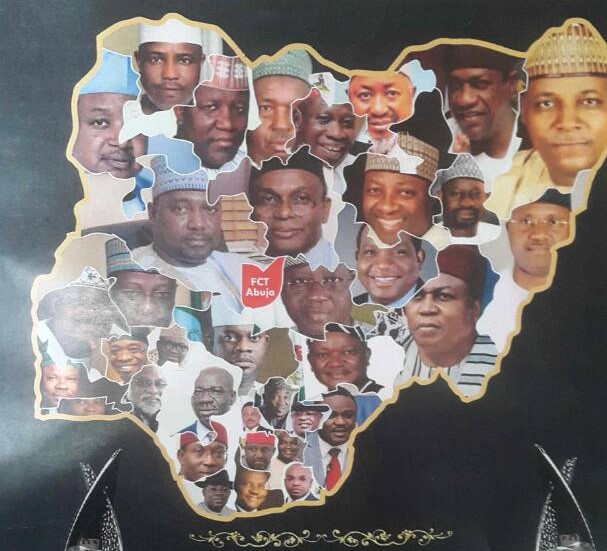By Akanimo Sampson
The Government of Nigeria under the watch of President Muhammadu Buhari has dealt a fatal blow on the governors of the 36 states of the federation who are insisting on controlling the finances of their local governments.
From all indications, Abuja is not willing to allow the cash-strapped governors have their way on councils’ funds. It is therefore, determined to free councils’ finances from the control of the governors in a seeming frantic bid to stimulate tangible grassroots development.
The Federal Government is planning to achieve this by abolishing state and local governments joint accounts ‘’through constitutional means.’’
This seeming cheery news filtered into the open as the Islamic State’s West Africa Province (ISWAP) claimed on Thursday that it killed 10 soldiers in an attack in Gajiram, a community in the bleeding Borno State on Wednesday.
The terrorists claimed through Amaq News Agency that the soldiers were killed in an attack at a military post in the community and that they also carted away six SUVs. Sahara Reporters, an online news portal had on Thursday reported that at least two civilians were killed while some houses were torched.
Quoting a local vigilante source, the news portal said terrorists attack the town about 5:00pm, burning part of the Divisional Police Headquarters and a telecommunications mast in the process. The attack has raised questions about the government assertions that it has defeated the insurgents.
The government in July claimed that Boko Haram’s 10-year-old insurgency had been “defeated’’, admitting that the international jihadists posed a growing threat.
President Buhari’s spokesman, Garba Shehu, said in a statement in July, “the position of the Nigerian government is that the Boko Haram terrorism has been degraded and defeated.The real Boko Haram we know is defeated.’’
According to Shehu, the country was now facing “a mixture’’ of Boko Haram remnants, criminal groups and jihadists from the Maghreb and West Africa fuelled by turmoil in Libya and the collapse of the Islamic State caliphate in the Middle East.
In spite of the government repeated claim, fact is, the over 10 years’ reign of the Boko Haram has killed more than 30,000 citizens and displaced two million others.
In the mean time, Boss Mustapha, Secretary to Government of the Federation (SGF), made the government decision to shut out the governors from councils’ funds known at a conference on Nigerian local governments, organised by SEGNIP Promotions Limited and the Department of State and Local Government Affairs, Office of the Secretary to the Government of the Federation (OSGF).
Before now, the Nigerian Financial Intelligence Unit (NFIU) had last May 6 issued a directive to commercial institutions via a document it tagged Guidelines to Reduce Vulnerabilities Created by Cash Withdrawals from Local Government Funds throughout Nigeria. The document sought to ban financial transactions on state/local governments joint account, and placed cap on cash withdrawals from local government accounts in Nigeria.
The directive to banks to stop transactions on such accounts met stiff opposition from the governors, leading to at least two law suits.
With the latest disclosure from the SGF, it seems the Buhari administration is poised on going on with its agenda on the local government finances. Mustapha, who was represented by David Attah, the Director of Special Duties in the SGF office, at the event described the joint accounts as inglorious.
He said the accounts have been grossly abused, leading to major frictions, pointing out that such abuse gave rise to the agitation for fiscal autonomy of local governments, and that states have starved local governments of needed funds to discharge their statutory responsibilities as an independent tier of government.
According to him, “after so many ruinous years of our recent past, we certainly cannot live with the continued mismanagement of public funds (joint account) any longer. Most of us know too well the dangers and consequences of this sustained degradation of our local government system which manifest in increased wave of crimes and social maladies like terrorism, kidnapping, cultism, neighbourhood gangs, human trafficking, baby factories, dilapidated primary schools and primary health facilities, influx of youths to urban centres and pernicious rural poverty which have dovetailed into various dimensions, agitations, and unrest.
“More so, it is uncanny that most of us fail to see the connection between moribund local governments and Boko Haram insurgency, for instance. Suffice to say that no ‘baby factory’ or incidence of kidnapping would find space where local government councillors are fully involved in governance and work with landlords associations and town unions.
“In the midst of all these, there is no state, not even one, that showed an example by devising a system that made the local governments work or gave a proper account of the local government funds. All of us, directly, or tangentially, are exposed to the impact of local government administration daily. Therefore, mismanagement and mal-administration at this level of governance will connote impacting negatively on our people with direct implication for banishing a large number of the population to abject poverty and penury.’’
For the SGF, with the introduction of the NFIU Act and the new local government administration account reporting system, President Buhari administration has taken steps to upgrade the anti-graft or money laundering regulations to reduce vulnerabilities created by cash withdrawals from local government funds throughout the country.

